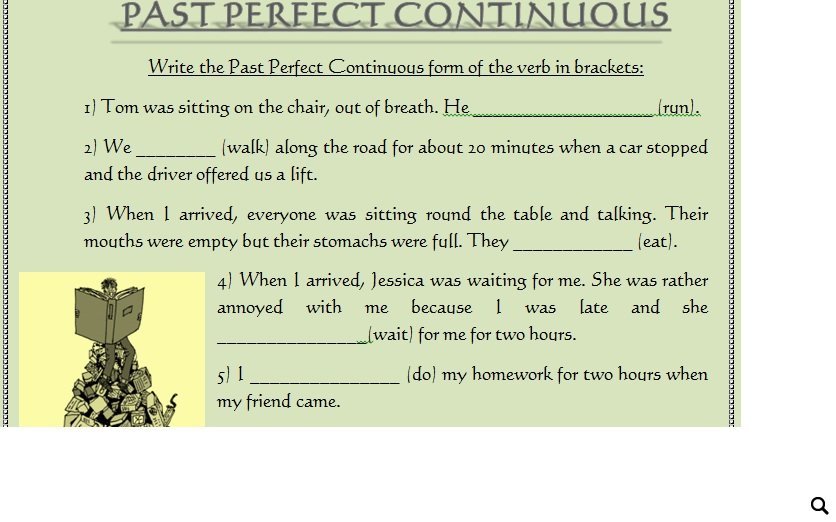
Past Perfect Continuous Forms
The past perfect continuous is formed using had + been + present participle. Questions are indicated by inverting the subject and had. Negatives are made with not
- Statement: You had been waiting there for more than two hours when she finally arrived.
- Question: Had you been waiting there for more than two hours when she finally arrived?
- Negative: You had not been waiting there for more than two hours when she finally arrived.
Past Perfect Continuous Uses
USE 1 Duration Before Something in the Past

We use the past perfect continuous to show that something started in the past and continued up until another time in the past. "For five minutes" and "for two weeks" are both durations which can be used with the past perfect continuous. Notice that this is related to the present perfect continuous; however, the duration does not continue until now, it stops before something else in the past.
Examples:
- They had been talking for over an hour before Tony arrived.
- She had been working at that company for three years when it went out of business.
- How long had you been waiting to get on the bus?
- Mike wanted to sit down because he had been standing all day at work.
- James had been teaching at the university for more than a year before he left for Asia.
- A: How long had you been studying Turkish before you moved to Ankara?
B: I had not been studying Turkish very long.
USE 2 Cause of Something in the Past

Using the past perfect continuous before another action in the past is a good way to show cause and effect.
Examples:
- Jason was tired because he had been jogging.
- Sam gained weight because he had been overeating.
- Betty failed the final test because she had not been attending class.
EXECISES


Put the verbs into the correct form (past perfect progressive).
- We (sleep) for 12 hours when he woke us up.
- They (wait) at the station for 90 minutes when the train finally arrived.
- We (look for) her ring for two hours and then we found it in the bathroom.
- I (not / walk) for a long time, when it suddenly began to rain.
- How long (learn / she) English before she went to London?
- Frank Sinatra caught the flu because he (sing) in the rain too long.
- He (drive) less than an hour when he ran out of petrol.
- They were very tired in the evening because they (help) on the farm all day.
- I (not / work) all day; so I wasn't tired and went to the disco at night.
- They (cycle) all day so their legs were sore in the evening.